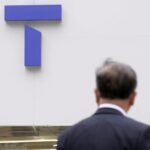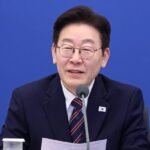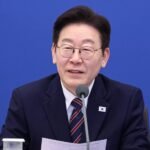(Courtesy of Getty Images)
South Korean investors are hoarding cash as Samsung Electronics Co., the world’s top memory chipmaker, huts local stocks and growing uncertainties over the US presidential election put pressure on Wall Street assets.
The balance of term deposits at South Korea’s five largest banks rose 11.5 trillion won ($8.4 billion) in October from the previous month, while money market funds, which focus on low-risk and short-term debt instruments, saw inflows of some 20 trillion won during the period, according to industry sources in Seoul.
“High-net-worth individuals tend to hoard cash for now because it is hard to invest even in commodities such as gold, which has reached record highs,” said a branch manager at a local brokerage house in Gangnam, Seoul’s upscale and wealthy district.
Wealthy retail investors in South Korea dumped domestic and foreign stocks amid intensifying uncertainties over the US election and South Korea’s controversial financial investment income tax, which had been expected to come into effect next year. Korea’s main opposition party said on Monday it has decided to support the government’s move to scrap a plan to impose the tax on retail investors.
Domestic investors with account balances of more than 3 billion won at three major South Korean securities sold a net 203.9 billion won in South Korean stocks and a net 705.4 billion won in overseas shares in the recent three months, showed an analysis by The Korea Economic Daily on Sunday.
WORST PERFORMING LOCAL STOCKS
Sluggish local stocks drove investors out of the market. The South Korean tech-heavy Kosdaq was the worst performer with a 14.3% loss, followed by the benchmark KOSPI with a 3.7% decline, in the first 10 months of the year among major 14 stock markets worldwide.
The daily trading value of the Kosdaq averaged 6.1 trillion won last month, the lowest since November 2022, while the value of the Kospi fell to a nine-month low of 9.7 trillion won. Investor’s deposits fell below 50 trillion won in October for the first time this year.
The stock market turnover ratio in September slipped to 19.6%, the lowest since the month of 2018.
That came as Samsung, the country’s most valuable company, skidded on weak profits, dragging the overall domestic stock market.
Retail investors chased the stock on dips, however, buying a combined net 12.4 trillion won in September and October, larger than individual investors’ total net purchases of 11.1 trillion won in the Kospi during the period.
They bought Samsung’s shares for an average of 65,850 won apiece over the past three months, suffering a loss of 11.5% based on its closing on Nov. 1.
Democratic presidential nominee US Vice President Kamala Harris (right) speaks during a campaign rally in Charlotte, North Carolina on Nov. 2, 2024 (File photo by Reuters via Yonhap)
US STOCKS, BONDS NOT ALTERNATIVES
US stocks and bonds were not South Koreans’ choices for investments.
South Korean investors dumped a net $1.2 billion in US shares in September and October as they were seen peaking out amid the neck-and-neck US election, which pushed up US Treasury yields despite the Federal Reserve’s interest rate cut.
Retail South Korean investors bought a net 2.9 trillion won worth of bonds in the over-the-counter market during October, marking the first month of the purchase of less than 3 trillion won this year.
Despite the move, the highly liquid South Korean government’s three-year bond yield rose to 2.939% on Nov. 1 from 2.78% on Oct. 2, while the five-year yield advanced to 2.995% from 2.843% during the period, according to the Korea Financial Investment Association.
By Sung-Mi Shim, Tae-Ung Bae and Bo-Hyung Kim
smshim@hankyung.com
Jongwoo Cheon edited this article.















